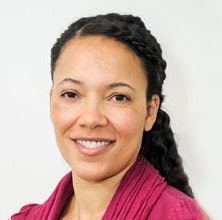 Summer Search CEO Amy Saxton says her organization makes it a point to ensure that males are not underrepresented in the program.
Summer Search CEO Amy Saxton says her organization makes it a point to ensure that males are not underrepresented in the program.By the time he reached high school, Isaac Silwal was already more intrepid than most, just by virtue of the many life changes he already had experienced. Born in Nepal, he lived in India for several years before immigrating to the US.
At his high school in Tukwila, Washington, Silwal was introduced to Summer Search, a national nonprofit that partners with high schools in seven urban areas on the east and west coasts. Summer Search takes promising high school students under its wing and sets them on the path to college and future success through intensive academic mentoring and other developmental programs. The focus is not just on academic success, but on creating well-rounded individuals with unique life experiences under their belt and a broad understanding of the world outside their home communities.
Though Silwal is ambitious, neither of his parents had gone to college, which meant he would be navigating a path that had previously not been charted by anyone in his family as he made his way through high school and potentially on to postsecondary education.
“When I came to the United States, I used to feel kind of alone, since I was not really confident talking with people, as well as since English is not my first language,” Siliwal said. “But after I entered Summer Search, I found that there were people who cared about me, who would guide me and wanted me to be a successful person.”
The majority—90 percent—of students in Summer Search are first-generation college-bound students. Though first-generation college students typically fare worse when it comes to college retention than their peers whose parents did go to college, Summer Search participants buck the trend: 80 percent of Summer Search high school graduates either have graduated or are on track to graduate from college.
“Our goal is to ensure that low-income high school students are able to get through college and give back as leaders in their families and communities,” said Amy Saxton, CEO of Summer Search. “We partner deeply with high schools that tend to have low graduation and college matriculation rates, because that’s the way we can make the most impact.”
The program’s success is built on its intensive mentoring program. Students are nominated to the program by teachers and administrators in their freshman year. Once accepted to the program, they are paired with a mentor, whom they speak with at least once a week. Mentors work with 25 students on average in sites off school grounds.
Mentors help guide mentees through the challenges of high school and remain in touch with them even after they reach college. “[It’s] not just about throwing money or scholarships at them, but it really is about consistency and helping them develop character and life skills,” said Sonia Torres, communications director at Summer Search.
Siva Gogulamudi, who graduated from Berkeley High School this spring, said that her mentor was accessible and proactive, helping her submit her FAFSA forms before the deadline and advising her on the right college. “You can go in whenever you want to ask for help,” Gogulamudi said. This fall, she will be a freshman at the University of California, Riverside, where she plans to study to become a doctor.
The other essential component to Summer Search, in addition to the mentoring, is its summer programming. Students participate in wilderness expeditions and summer study at various colleges and schools across the nation. “Many of our students have never left the community, never have been on a plane, never stepped foot on a college campus,” Saxton said.
Silwal spent one summer studying at Northfield Mt. Hermon, an independent school in western Massachusetts. “That was one of the best trips I ever went on in my life,” he said. “Really because of the diversity that they have there. I love being with people from all over the place. We had people from all over—from China, Japan, Bangladesh.”
For Gogulamudi, a summer expedition backpacking and sailing in the Northern Cascades and San Juan Islands of Washington State was one of her most difficult Summer Search experiences, but also the most impactful.
“I feel like I can do anything now,” she said.
Since its beginnings in 1990, Summer Search has worked with around 5,000 students. Saxton, who came aboard as CEO in 2011, said that she would like to see the program grow and continue to innovate.
“There are so many more students that are out there. We served 5,000 up to this point, but there’s no lack of need for the sort of services that we provide,” she said. “[In an ideal world], we would be out of business because every kid, every low-income student—especially our young men of color—would have opportunities to thrive and get through college, if that’s the path that they want to pursue. But I don’t see that happening for all students.”
Another problem Saxton identified is the need to serve a better balance of males and females. “Many youth development nonprofits tend to enroll more young women than young men,” she said. Summer Search now asks its partners to refer one young man for every young woman that they refer, with the result that about 40 percent of the students enrolled in the program are male.
For the students who do participate in Summer Search, the experience is a transformative one. Silwal put it simply: “Basically, everybody who is in Summer Search loves it.”
Staff writer Catherine Morris can be reached at [email protected].















